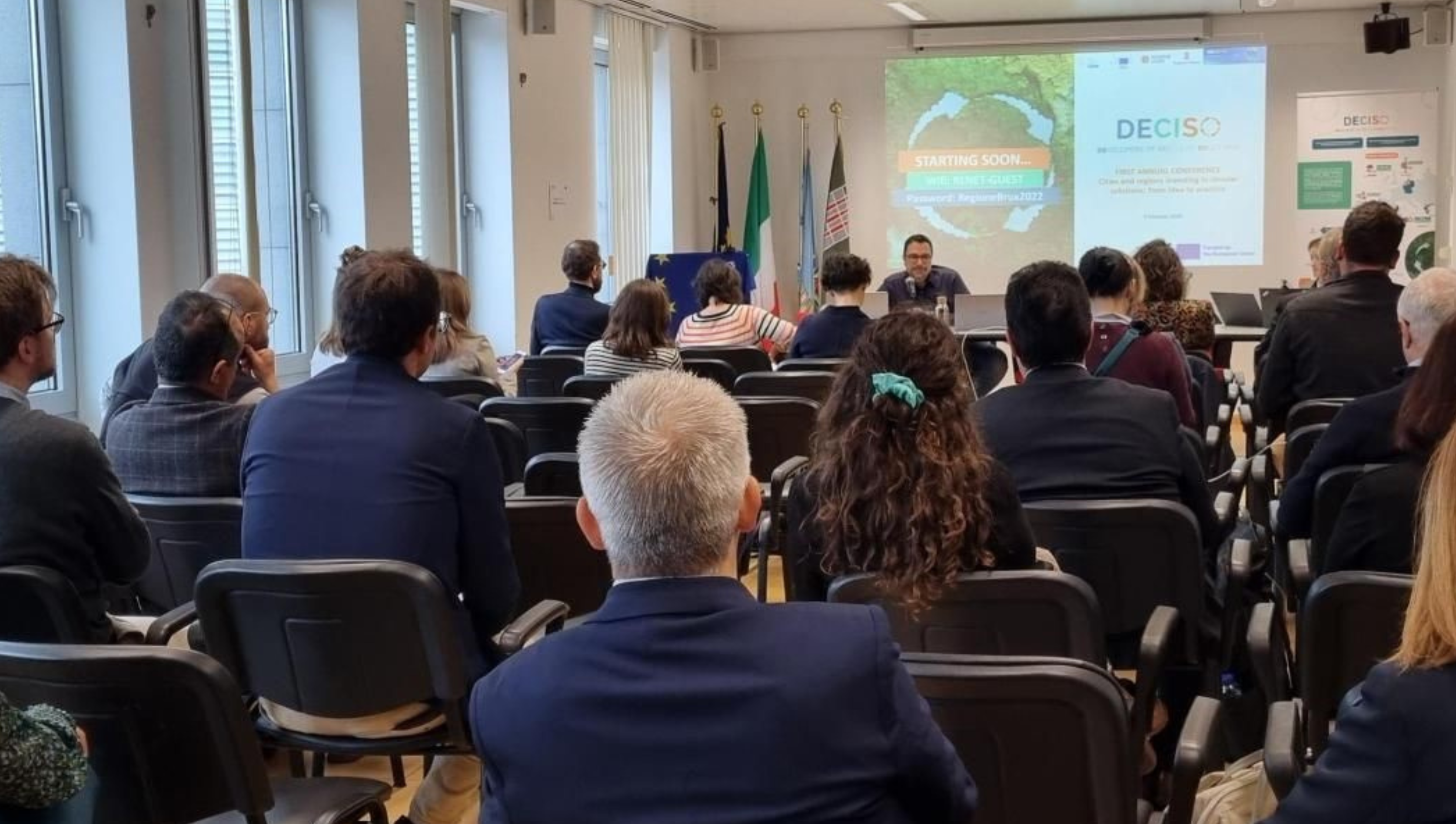DECISO (DEvelopers of CIrcular SOlutions) is a Horizon Europe project running from 2023 to 2025 which will assist European cities and regions with developing financing schemes for circular economy initiatives. This year, its annual conference focused on Cities and regions investing in circular solutions: from idea to practice.
On October 9, 2024, a representative from EBN, project partner on the Resource project attended the DECISO annual conference organised by ACR+ | Association of Cities and Regions for sustainable Resource management.
The theme of the conference was “Cities and regions investing in circular solutions: from idea to practice”.
After a welcoming speech by the hosts Regione Lazio and Regione Umbria and an overview of the DECISO project by Patrizia Grifoni from Consiglio Nazionale delle Ricerche, the speakers, practitioners and experts tackled the following subjects during the day: Creating financing schemes for circular economy projects, Circular agrifood business models, Biomass valorization and Water resilience. Speakers were then invited to share learnings about ‘Project development assistance for the circular economy’. Experts from various regions came together to share their strategies, challenges, and opportunities in developing financial models that support circular initiatives.
The representative from the Free and Hanseatic City of Hamburg, highlighted how the city is focusing on public resources, regional eco-funds like the European Regional Development Fund (ERDF), and private investments to support circular economy projects. With a strong corporate presence in Hamburg, one of the main challenges is convincing private companies to invest in circular economy initiatives.
Hamburg has taken an innovative approach by creating a “Pop-Up Circular Hub,” which acts as a platform for knowledge-sharing and collaboration. This hub involves key partners from various sectors and offers open-source labs like the “Open Lab Micro Factory at PuCH,” where companies and organizations can collaborate on developing circular solutions.
Delia Sola, from the Government of Navarre, shared the region’s experience in supporting the circular economy through its high degree of autonomy. Navarre has been running programs for startups focused on green and circular innovations for over 20 years, providing tailored grant schemes to help companies shift toward circularity.
One key initiative is the European Circular Innovation Valley (ECIV), a public-private initiative that aims to develop circular EU value chains with a mission-oriented approach. Over the next five years, the ECIV will support 19 entities across nine territories, with a budget of 27 million euros, helping companies of all sectors to navigate the transition to a circular economy.
Navarre is also leading in training initiatives, focusing on capacity-building for consultants and working groups to address the specific needs of companies in the circular economy. By offering training and advisory services, the government fosters an environment where companies can seek support to overcome challenges related to circular innovation.
Circular Agri-Food Business Models in Portugal: Rosa Onofre, representing the southern region of Portugal, presented key findings on circular agri-food business models. She emphasized that although many SMEs are interested in transitioning toward circularity, they face significant barriers, such as access to finance and high levels of bureaucracy. Particularly, the smallest companies, referred to as “nano-companies,” struggle to navigate the complex landscape of circular economy financing.
Finally, in a participatory session, experts and practitioners delved into the challenges of advancing circular economy projects to a bankable state. Andrea Accorigi emphasized two primary barriers: market challenges and investment barriers. To address these, Project Development Assistance (PDA) has become a critical tool in helping projects mature, both legally, financially, and technically, making them more attractive to investors.
Francesco Niglia of DECISO added that supporting local authorities is crucial to ensuring the success of circular economy initiatives. He discussed the importance of offering grants or low-interest loans to startups (SUs) to help them reach the maturity needed for further investment.
Lorenzo Valeriani of Circular Invest underscored the importance of understanding investor expectations. Startups and SMEs need to demonstrate tangible impact and show investment readiness. Circular Invest has supported several projects by helping entrepreneurs refine their business models and connect with potential investors. Valeriani stressed the need for open innovation platforms where companies can test the technical feasibility of their solutions before seeking financial backing.
Elisa Gambuzzi, representing HOOP, and Emma Pipó from BIOBOOST, both highlighted the “valley of death” challenge, where circular economy projects struggle to survive between early-stage development and scaling. Elisa noted that private investors are often hesitant to lend capital unless a business model shows stability. For circular economy initiatives, achieving technological and market feasibility must come before financial feasibility.
To bridge this gap, Elisa recommended increased funding for projects between Technology Readiness Levels (TRL) 7 to 9, where technical feasibility is proven but market readiness still needs validation. Project Development Assistance can play a crucial role here, helping companies navigate public funding schemes and de-risk their business models before approaching private investors.
In conclusion, the insights shared during the session emphasized that financing circular economy projects requires a combination of public-private collaboration, innovation ecosystem mobilization, and tailored financial schemes.
